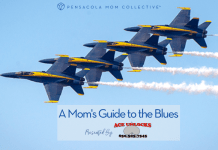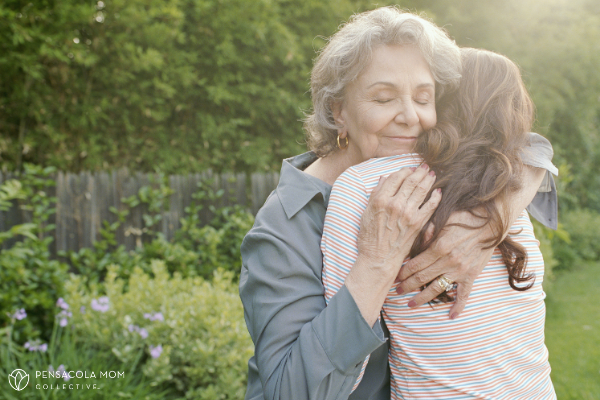Living in the same town I was born in, I can throw a rock and hit a friend–not that I would, but you get the idea.
I’m surrounded by friends of my childhood who watched my goofy front teeth arrive; high school friends whose paths now cross mine in our busy days of our own children attending school together; and the friends I’ve selected as an adult, those lovely souls who suit my heart’s whims, my need for lively conversation, and the support necessary for navigating family life, quarantined or not.
While most of my close friends fit a certain demographic– fellow moms, in our 4th or 5th decade, struggling to think of new lunchbox ideas, forgetting things on our Walmart lists, and relearning how to multiply fractions–one of my dearest friends is a bracket or two ahead of me, and that has proven to be uniquely valuable.
I noticed her perfectly coiffed hair at church one Sunday. Her rolled chignon appeared somehow effortless and easy, soft and relaxed, a daily task of muscle memory. She read the prayers in the service that week, an indecipherable accent–midwest, perhaps–soft and lyrical. The happiest eyes perfected her kind face.
At some point soon after that, we met. I realized I knew her son and daughter-in-law, who were my age, but it wasn’t until we were in a theology class together that I realized a formidable truth: I want to be her when I grow up.
When the quarantine distancing wore on both our souls, a rare morning visit provided a much-needed hug. It was in that moment that I realized the gift of her friendship, unique and necessary.
You, too, need an intergenerational friendship in your life. And here’s why.
Her friendship offers me a unique perspective on the other relationships in my life.
She nurtures me, but she’s not my mother, whom I adore and endeavor to emulate, too. She’s sisterly, but she’s not my sister, who is my heart’s other half. She’s not the friend I call in a carline pinch. And she’s not the neighbor I unwind with on the porch on a random Tuesday afternoon.
Instead, our friendship is absent of holiday drama, clumsy baggage, or competition over sharing the people in our lives. I can talk things out with her when same-generation issues arise. I may receive a fresh perspective on an old hurt or a way to test out a scenario from the point of view of someone with more experience. Her gentle distance from those closest to me creates a safe place to share and be the ever-evolving version of myself.
She’s been there and survived.
She persevered through the infant/toddler stage while overseas, nonetheless; she survived the complicated preteen parenting years during the busiest phase of her husband’s career. Although she’s on the other side of my current life stage, her perspective is fresh and full of wisdom. She hears my delight in the small things and tells me I’m doing a good job. She sees my anguish when I’ve fallen short and reminds me of the brevity of these stages and to persevere. Because she’s not in the same stage of life, she listens with a tone of reminiscence and sometimes a hint of regret. It’s this twinge that helps me to see the temporal aspect of each new season and even ways to enjoy the one I’m in.
She’s in a different stage than I’m in.
She’s available at different times of day and with a different sort of flexibility than many of my co-momming friends. Not overwhelmed by multiple text strings about soccer uniforms or PTO night, I often get a prompt response to my questions, or don’t feel bad bothering her with a quick story or thought. In fact, I’ve come to realize that my intrusions actually delight her, so I’ve stopped apologizing for them. Spending time with her doesn’t conflict with engagements with my peer friends, which often correlate to soccer games, birthday parties, or school carline. It’s wonderful how often our quite different schedules complement one another and allow for interactions.
My problems aren’t blurred with hers. We deal with different issues, so instead of commiserating with me, she lifts me up and shows me what I get to look forward to in the next stage. Quiet, slow mornings, with endless cups of hot coffee. One on one time with my husband. Extraordinary travel. Time to read and garden. Doting on grandchildren. And she makes it all look wonderful.
She opens my mind.
Childhood days on a remote island in Alaska, college years in Europe during her parents’ posts in Germany, excitement overseas as a young military wife and mother, and assignments across the deserts of the Middle East and North Africa– her life has all the chapters of a fabulous book, rich with character development and plot twists. To be her friend is to join a list of women of various motherlands, religions, regions, and ethnicities. She has collected friends along her life’s journey. I feel loved for my own contribution to our friendship and as a member of that list. Her stories of experiencing the beautiful diversity of the world and the perspective those experiences provided her life enrich my own.
She sets yet another beautiful example for me.
Perpetually, I’ll admire her as a wife, mother, mother-in-law, and grandmother, her favorite roles, the ones in which I first met her. But this year when she lost her mother to Covid-19, it was heart-wrenching to glimpse my friend as the daughter who couldn’t visit during her mother’s illness and has yet to be able to join her family in person to celebrate her mother’s life. Through it, she’s shown me how to care from a great distance and mourn under the limitations of our circumstances. She’s another lovely example for me of how to live with love leading the way.
I seek her out, and she chooses me, too.
The foundation of our friendship isn’t convenience or proximity like work or a neighborhood. We aren’t connected through a network of other people. Our friendship isn’t tied to a sports season or a child’s grade level or homeroom. What we share in common is a love of God, our families, learning, and goodness. We are friends because our hearts sense something in the other that we love, and we simply enjoy the gift of the other. We make our time together happen because we desire it.
You, too, need an intergenerational friendship in your life.
It occurs to me that it’s not in spite of our differences– the years, the life stages, the life pulling on us from every angle–that we are such good friends, but because of them. At any stage, at any age, a true friend is an extension of ourselves. As I shape my friends list to in turn shape me, I look for the woman I long to be, and I count Patricia as one highly prized.
Thoughts On Cross-Generational Friendship by Patricia McGraw
Five seconds after she walks in, we are deep in discussion. It might be books she can recommend for young readers, it might be an issue needing clarification on pop culture, or it might be a question about the best time of year to travel to Budapest. We might share an application of a verse from Ecclesiasticus or figure out the quickest, most useful method for making a lot of masks.
Age in a friendship like this is mostly irrelevant. We have so many interests in common, and we share information, experiences, and sorrows. Really, I don’t see myself in the mentor role in these friendships; instead, I find that many times the younger generations apply new rules to old relationships and do better with them than my generation. I learn a lot from Laura.
The best part is the laughter. We are serious women who need to lighten up from time to time, and we are able to laugh at ourselves and our predicaments together. Our friendship gives me new perspectives, and she gives me hope for the future of our community, and nation.















